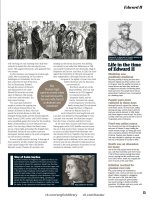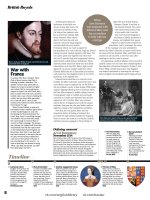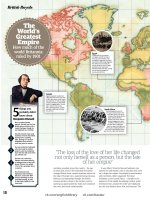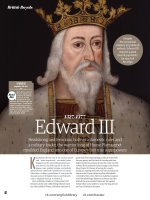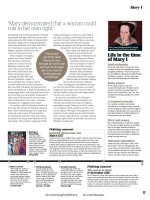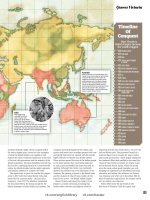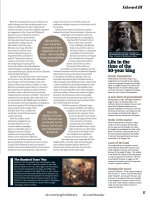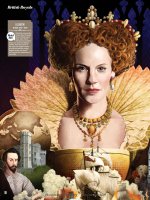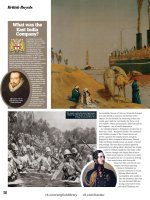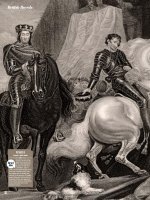All about history book of british rs 46
Bạn đang xem bản rút gọn của tài liệu. Xem và tải ngay bản đầy đủ của tài liệu tại đây (269.29 KB, 1 trang )
British Royals
Despite
the occasional
military (or political)
setback, Edward III
enjoyed a great
deal of popularity
for much of
his reign
EDWARD III
England, 1312-1377
Much like his ancestor
Henry II, Edward was
famed for his military
successes and the
restoration of royal
authority. His 50-year reign saw
impressive highs – including the
country transforming into one
of the most formidable military
powers in Europe – and crushing
lows, such as the grip of the
merciless Black Death.
Brief
Bio
1327-1377
Edward III
Headstrong and ferocious, both as a domestic ruler and
a military leader, the warrior king of House Plantagenet
moulded England into one of Europe’s first true superpowers
K
ing Edward III was one of the most proactive
and – more importantly – successful rulers
England and its surrounding realms have
ever known. His half-century of rule saw
plague, wars, political intrigue and judicial
upheaval that collectively transformed our small
island into a military powerhouse. It was quite the
dramatic period of English history and Edward’s
road to kingship was just as theatrical.
Born at Windsor Castle on 13 November 1312,
Edward was the only child of King Edward II and
his wife, Isabella of France. His father had spent a
46
great deal of his reign battling a political rivalry with
his own gentry and the birth of a strong male heir
helped fortify his position, at least for a time. In 1325,
Edward II was required to pay homage to the French
king, Charles IV. Uneasy at leaving the country
during an ongoing and costly war with Scotland, the
king sent his 13-year-old son and his wife Isabella
on behalf of the crown. However, Isabella conspired
with the exiled Roger Mortimer (a former earl who
had led the unsuccessful Despenser War against
Edward four years earlier) to usurp the king and set
up Prince Edward in his place.
vk.com/englishlibrary
vk.com/bastau
